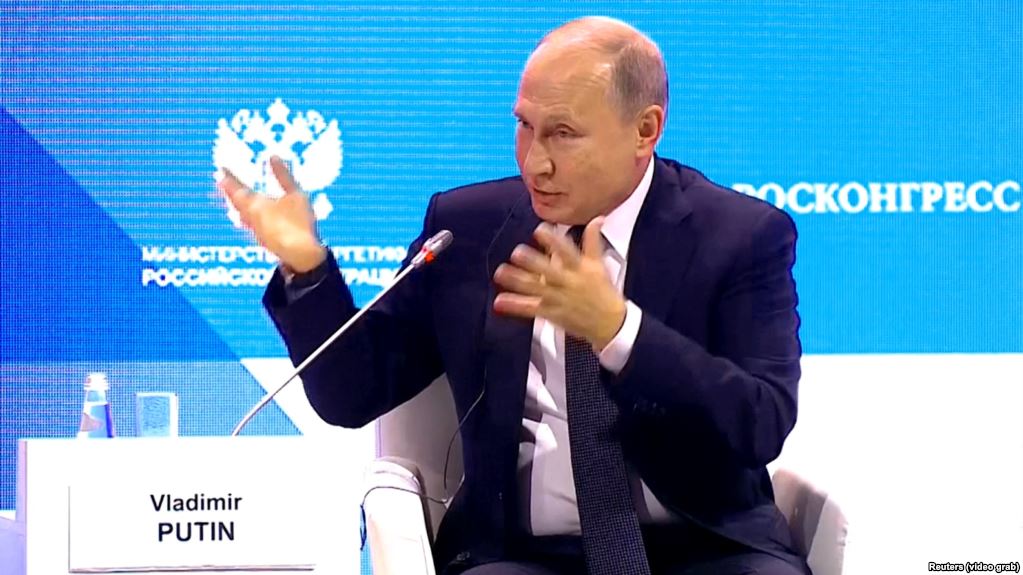
By Polygraph
Some media outlets are “pushing through a theory that Mr. Skripal is some sort of a rights activist. He’s plainly a spy. A traitor to his homeland. There’s such a thing – being a traitor to the homeland. He is one … Imagine, if there’s a person in your country who betrayed it. How would you treat him? He’s plainly scum.”
FALSE
Skripal was always seen as spy, not a saint
Speaking at the Russian Energy Week International Forum in Moscow on Wednesday, October 3, Russian President Vladimir Putin was asked about the prospect of even more Western sanctions following the poisoning of Sergei Skripal.
The Russian president delivered a scathing rebuke to what he views as the West’s elevation of Skripal, the former Russian military intelligence officer who, along with his daughter, was poisoned with the nerve agent Novichok on March 4, 2018.
Putin on Skripal: “He’s just a spy, a traitor to his fatherland. He’s a scumbag, that’s all.” pic.twitter.com/b4cOybRdq6
— Lucian Kim (@Lucian_Kim) October 3, 2018
Putin said the poisoning scandal had been “artificially inflated,” and that several Western media outlets had pushed the idea that Skripal is some sort of a rights activist, when he “is plainly a spy – a traitor to his homeland.”
Putin then added that Skripal is “simply scum.”
“This Skripal, as I’ve already said, is a traitor, who was caught, punished and who spent five years behind bars. That’s it. He went abroad and continued to cooperate, consulting some intelligence services there,” said Putin.
In fact, Western media have uniformly referred to Skripal either as a spy or military intelligence agent.
AFP, in a report carried by CBS, called Skripal “a former military intelligence colonel who was jailed for betraying Russian agents to Britain’s MI6 foreign intelligence service.”
The BBC has described him both as a “former spy” and “former Russian double agent” who was “convicted of passing the identities of Russian intelligence agents working undercover in Europe to the UK’s Secret Intelligence Service, MI6.”
Fox News reported that Skripal “provided information about GRU agents in Europe, receiving over $100,000 in return.”
Fox also cited Russian media reports that quoted Russia’s FSB domestic security agency as saying “the damage from his activities could be compared to harm inflicted by Oleg Penkovsky, a GRU (Russian military intelligence) colonel who spied for the United States and Britain. Penkovsky was executed in 1963.”
The Australian Broadcasting Corporation similarly described Skripal as a former Russian military intelligence colonel who “was charged with ‘high treason in the form of espionage’ and sentenced to 13 years in prison.”
USA Today reported that Skripal was working as a Russian military intelligence officer when the United Kingdom recruited him “to pass state secrets on to MI6.”
Regarding his motives and his character, while not always negative, few descriptions in Western media could be construed as particularly glowing.
For example, on September 9, the New York Times ran a piece characterizing Skripal as a “small fish.”
“This is how British officials now describe Mr. Skripal, a Russian intelligence officer they recruited as a spy in the mid-1990s,” the NYT reported.
One former associate, Oleg Ivanov, who worked with Skripal in the Moscow regional governor’s office, said he was “always looking for side hustles.”
“By his psychological type, he was a materialist,” Mr. Ivanov told the NYT. “He simply loved money.”
As the paper noted, Ivanov “found Skripal’s betrayal, if not especially honorable, at least comprehensible.”
Spiegel Online similarly called Skripal a “peripheral figure,” adding the former spy did not “seem to have made much of an impression on the people who know him.”
The Mirror, calling him a spy, double agent and colonel in Russian military intelligence, said neighbors described him as “quiet” and “casually dressed,” but not a human rights defender.
Other outlets have reported that Skripal had “continued to cooperate” with Western intelligence.
The Guardian, for example, said Skripal “had betrayed the motherland but admitted his crime.” In another report, the paper hypothesized that the “demonstrative killing of a traitor could be a warning to junior officers not to follow the same path.”
The paper went on: “One possible reason is that Skripal was being punished for a continuing relationship with British intelligence, or the suspicion of one.”
CNN mirrored that framing, calling Skripal a “former GRU officer who arrived in the UK with a pardon as a result of a spy swap in 2010,” adding he “was active again – with the connivance or encouragement of the UK intelligence services.”
Based on dozens of reports from as many Western media sources, we found no outlet that ever referred to Skripal as anything other than what he was — a former spy convicted of treason and potentially poisoned for once again returning to intelligence gathering activities.
Putin, during his annual Q&A in 2010, had warned of a harsh fate for traitors, saying they would “choke on their 30 pieces of silver.”
But Skripal’s character has played no part in staunch Western opposition to the deployment of military grade chemical weapons on British soil. Likewise, while Skripal was never portrayed as a human rights defender.
A joint statement on the attack, signed by British Prime Minister Theresa May, President Donald Trump, French President Emmanuel Macron and German Chancellor Angela Merkel, read:
“[The Skripal poisoning] is an assault on UK sovereignty and any such use by a State party is a clear violation of the Chemical Weapons Convention and a breach of international law. It threatens the security of us all.”
And so we find that Putin’s claim that Skripal has been portrayed as “some sort of human rights defender,” and that the ensuing media firestorm has been “artificially” blown out of proportion, is false.
By Polygraph








